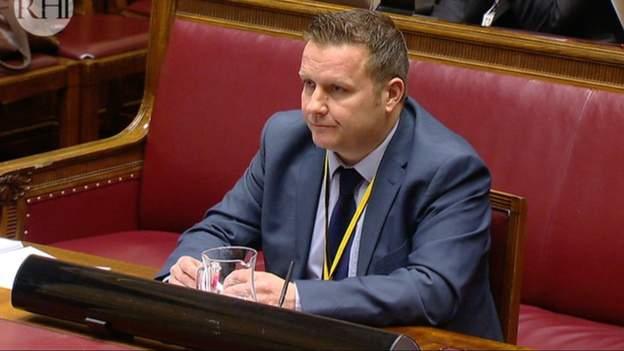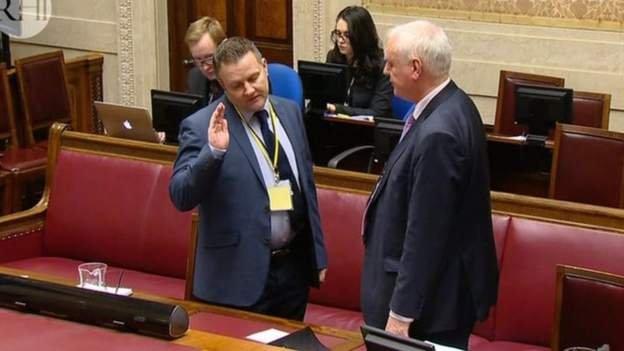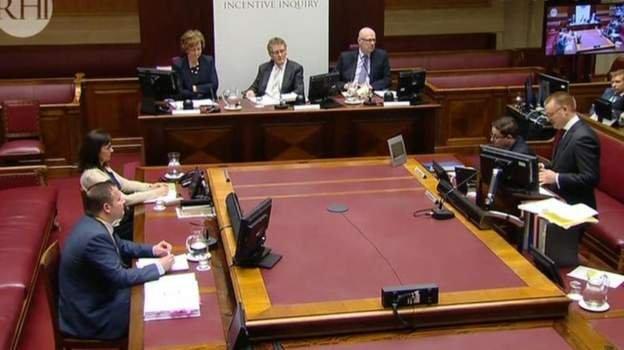RHI official denies causing 2015 spike in applications
- Published

Stuart Wightman was head of DETI's energy efficiency branch from June 2014
Advance notice of changes to the RHI scheme were circulated by the man who helped run the green energy scheme, the public inquiry has been told.
Stuart Wightman claimed his actions had not contributed to a huge spike in applications which threw the budget into chaos.
But he admitted that with the benefit of hindsight he would not have done it.
Mr Wightman took over responsibility for the scheme in 2014.
In July 2015, he began informal consultation with poultry giant Moy Park and a number of renewable energy companies about proposed changes in the scheme.
They were introduced in November that year.
They included cost controls designed to address growing pressure on the budget from increasing numbers of applications.
'Nothing to hide'
The changes would move applicants off a lucrative flat-rate tariff for 20 years, to a much less attractive one which was tiered and capped.
In his witness statement, external, Mr Wightman said he now accepted that his "engagement with the industry led to increased awareness of the proposed changes".
"However, there is no evidence of an increase in applications during July or August 2015."
He said he had recorded details of his contacts on a departmental database, proving "we had nothing to hide".
The big surge in numbers came in October and November between the cost controls being publicly announced in September and taking effect in November.
In that period the number of boilers on the scheme doubled as did the financial liability as firms sought to get into the scheme before the lucrative tariffs were abolished.
'Did not understand'
Mr Wightman said although his informal consultation had begun in July 2015, his department had been getting an increased volume of calls about upcoming changes in June.
Mr Wightman said the catalyst for those calls was "unclear".
"I respectfully consider and suggest that this is an important issue for further investigation by the inquiry."

Mr Wightman was responsible for developing renewable heat and energy efficiency policies
Mr Wightman defended his informal consultation with industry.
He said to have made changes without some contact with stakeholders would have left the department open to legal challenge.
He said he also did not understand the implications for the Northern Ireland budget of an overspend on the scheme, or that RHI was already providing "overgenerous" payments to applicants.
Mr Wightman said he had drawn up a submission for the then Enterprise minister Jonathan Bell in July 2015 in which he advised cost controls be introduced to the scheme from 1 October 2015.
By then the department's liability for RHI payments in 2015/16 was twice the allocated budget of £12m and growing.

Mr Wightman said £20m could have been saved if his advice had been followed
In August the decision was taken by Mr Bell to defer the introduction of the controls until 4 November, 2015.
They were finally brought in on 18 November.
'Budgetary pressures'
Mr Wightman said had the changes been made from October as he had suggested, 884 applications which got accreditation would not have been accepted onto the scheme.
That would have saved £20m a year for two decades.
Mr Wightman said the minister's position was "difficult to understand" given the "clear budgetary pressures" that had been set out in his July submission.
But he also conceded the submission did not say that an overspend would have to be paid out of the Northern Ireland block grant rather than by Treasury.
Mr Wightman said he did not understand the implications of the overspend for the Northern Ireland budget until late November 2015.
- Published20 March 2018

- Published7 November 2017

- Published7 November 2017
